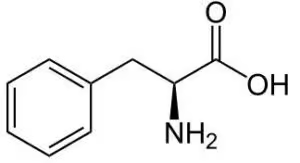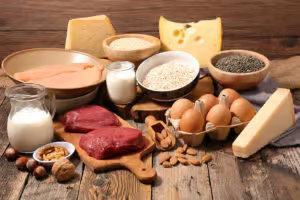Table of Contents
Phenylalanine is a highly bio-available essential amino acid. Your body naturally converts L-Phenylalanine into the amino acid L-Tyrosine which is then converted into L-DOPA. Decarboxylation of L-DOPA results in synthesis of the neurotransmitter dopamine.[i]
Once converted into dopamine, the enzyme dopamine-beta-hydroxylase converts dopamine into the neurotransmitters norepinephrine (noradrenaline) and epinephrine (adrenaline). This triad of neurotransmitters are collectively referred to as “catecholamines”.
As a nootropic supplement, you may find several different forms of Phenylalanine available. L-Phenylalanine is the natural form found in proteins. D-Phenylalanine is a mirror image of L-Phenylalanine that is made in the lab. And DL-Phenylalanine is a combination of the two forms.[ii]
L-Phenylalanine can be a highly effective nootropic for boosting cognitive function because it boosts norepinephrine and dopamine production. Resulting in increased attention, motivation and working memory.
D-Phenylalanine (but not L-Phenylalanine) has been used to treat chronic pain although the clinical research in this area is sparse.
L-Phenylalanine also stimulates the production of thyroid hormones T3 (triiodothyronine) and T4 (thyroxine) which are crucial in maintaining both overall physical and cognitive health.
Phenylalanine helps:
- Cognitive Stress. L-Phenylalanine helps produce the catecholamine-triad of neurotransmitters dopamine, norepinephrine and epinephrine. Sleep deprivation and extreme stressors like heat and cold can deplete catecholamine levels. L-Phenylalanine restores them to preserve optimal cognition.[iii]
- Neurotransmitters. Phenylalanine is a necessary precursor for dopamine, norepinephrine and epinephrine. As your dopamine levels increase, you’re better able to concentrate, organize your thoughts, and stay productive.
- Attention Deficit Disorder (ADHD). L-Phenylalanine can be an effective treatment for some with ADHD symptoms. L-Phenylalanine works in synergy with pharmaceutical drugs like Ritalin and Adderall by boosting extracellular levels of dopamine. Helping these drugs be more effective. And mitigating side effects like crashes when the drug wears off.
What is Phenylalanine?
L-Phenylalanine is an essential amino acid that you get from food or a supplement. The enzyme phenylalanine hydroxylase converts Phenylalanine in your liver into the amino acid L-Tyrosine.[iv]

Phenylalanine is found in protein-rich foods like soybeans, cheese, nuts, seeds, beef, lamb, chicken, pork, fish, eggs, dairy, beans, and whole grains. The artificial sweetener aspartame also contains Phenylalanine.
Your brain converts L-Tyrosine to L-DOPA which then produces the neurotransmitter dopamine. The unused dopamine is then further converted into the neurotransmitters norepinephrine (noradrenaline) and epinephrine (adrenaline). This triad of neurotransmitters are collectively referred to as “catecholamines”.
Many neurohackers prefer L-Phenylalanine over other catecholamine precursors because it supports neurotransmitter production without directly increasing neurotransmitter levels.
This last part is key because indiscriminately increasing neurotransmitters across the board can lead to imbalances and tolerance. Which can defeat the purpose of taking the nootropic in the first place.
For example, not enough epinephrine can decrease cognition. And too much norepinephrine can decrease attention, processing speed and executive function.[v]
L-Phenylalanine vs. D-Phenylalanine: What’s the Difference?
L-Phenylalanine is an essential amino acid which means you must get if from food. Or as a supplement. Your body cannot synthesize Phenylalanine on its own.
L-Phenylalanine (LPA) is converted into the amino acid L-Tyrosine in your liver. Once L-Tyrosine crosses the blood-brain barrier, it is converted into L-DOPA. Which is further converted into the neurotransmitters dopamine, norepinephrine (noradrenaline) and epinephrine (adrenaline).
D-Phenylalanine (DPA) is a synthetic version of, and mirror image of L-Phenylalanine created in the lab. DPA has a different mechanism of action in the body than LPA.
D-Phenylalanine (DPA) slows the action of the enzymes carboxypeptidase A or endorphinase and enkephalinase. These enzymes degrade endorphins. Slowing down these enzymes that reduce endorphins can help reduce pain.[vi]
DL-Phenylalanine is a 50/50 combination of L-Phenylalanine and D-Phenylalanine. By combining the two in theory you get the best of both an antidepressant and pain reducer.
How does L-Phenylalanine work in your Brain?
L-Phenylalanine boosts brain health and function in several ways. But two in particular stand out.
- L- Phenylalanine decreases depression. L-Phenylalanine is converted into L-Tyrosine which in turn is converted into L-DOPA in the brain. L-DOPA is then used to make the feel good neurotransmitter dopamine. So depression could be the result of not getting enough of the first amino acid (L-Phenylalanine) in the chain of events needed to produce dopamine.
In one study done in Germany, 20 depressed patients received from 75-200 mg per day of DL-Phenylalanine for 20 days. At the end of the trial 12 of the depressed patients could be discharged without any further treatment. 4 of the patients had a moderate decrease in depressive symptoms. And 4 patients showed no response.[vii]
- L-Phenylalanine boosts neurotransmitters. L-Phenylalanine turns into L-Tyrosine once taken as a supplement. It then converts into the neurotransmitter dopamine. Dopamine is used to control movement in your body, is fundamental to memory, attention and problem solving.
The unused dopamine can then convert into the neurotransmitters norepinephrine (noradrenaline) and epinephrine (adrenaline).
Norepinephrine is important for attentiveness, emotions, sleeping, dreaming and learning.
Epinephrine drives your ‘flight-or-flight’ response. It’s what prompts your reaction to dangerous circumstances, emergency situations, or in stressful situations or environments.
This balance in neurotransmitters is critical to the fully optimized, healthy brain. And why some neurohackers choose L-Phenylalanine to allow the body to make the neurotransmitters it needs. Instead of causing an imbalance by boosting one neurotransmitter over another.
A study in Venezuela investigated ADHD and autism, and the implications of amino acids on these neuropsychiatric disorders. 40 subjects affected by autism and 11 with ADHD along with 41 healthy subjects were included in this study.
The researchers found that those with ADHD had decreasing Phenylalanine and increasing glycine which disrupted their inhibitory neurotransmission system. Not enough phenylalanine and increasing lysine was present in those with autism.[viii]
Another study at Ohio State University looked at amino acids in 28 ADHD patients. And found all subjects with ADHD had significantly lower levels of the amino acids phenylalanine, tyrosine, tryptophan, histidine, and isoleucine. The researchers concluded each subject had a general deficit in amino acid transport, absorption or both.[ix]
How things go bad if you are dopamine deficient
As we get older, our brain and body chemistry and energy metabolism changes.
↓ Dopaminergic neurons are damaged or die
↓ Neurotransmitter levels decline
↓ Thyroid hormones decline
↑ Stress levels increase
↓ Working memory and mood decline
All of these changes are often attributed to aging. But could be a result of dietary and lifestyle choices. Unchecked, they could lead to neurodegenerative diseases like Parkinson’s, a drop in quality of life and depression.
L-Phenylalanine benefits
L-Phenylalanine can boost levels of the neurotransmitters dopamine, norepinephrine and epinephrine. And can help a sluggish thyroid produce more T4 and T3.
L-Phenylalanine can help boost cognition especially in stressful situations. It helps improve decision making, ‘flow state’ and creativity, cognitive flexibility, and working memory.
L-Phenylalanine converts into L-Tyrosine which then converts into L-DOPA to produce dopamine. L-DOPA is also used to make melanin in your body. This conversion process helps in the removal of neurotoxic quinones. And chelates heavy metals like mercury and lead which can accumulate in and damage neurons.
The dopamine that is not used by your brain is available to produce norepinephrine (noradrenaline) which is important for attentiveness, emotions, sleeping, dreaming and learning.
L-Phenylalanine may be an effective nootropic when stacked with ADHD/ADD meds like Ritalin or Adderall. It helps supply extracellular dopamine needed to improve the effectiveness of stimulants used to boost the uptake of dopamine in your brain.
How does L-Phenylalanine feel?
Keep in mind that L-Phenylalanine is a precursor to catecholamines. So if you’re not ‘low’ on dopamine, norepinephrine or epinephrine – you may not ‘feel’ anything.
Many neurohackers report a lift in mood, better focus, concentration, increased energy, and an overall sense of well-being. L-Phenylalanine can help readjust your motivation levels. It can help lower anxiety levels, especially social anxiety.
Supplementing with L-Phenylalanine can help bring your blood pressure down if its elevated from a stressful situation or environment. Take it before the stressful event if you can.
L-Phenylalanine helps buffer the effects of stimulants like caffeine or amphetamines. It helps potentiate and prolong the effects of Ritalin or Adderall, and reduces the crash.
If you’re into athletics or do manual work, you’ll find that supplementing with L-Phenylalanine before a workout or construction job can leave you feeling great afterwards. It may help mitigate many of the effects of acute stress caused by short-term stressors.
And L-Phenylalanine helps your body produce L-Tyrosine which helps to produce melanin, so you may find it easier to get a tan while at the beach.
L-Phenylalanine Clinical Research
Phenylalanine as an Antidepressant
Several studies have investigated using Phenylalanine for the treatment of depression. One study published in the journal Arzneimittel-Forschung looked at using DL-Phenylalanine in a small group of patients who failed to respond to popular antidepressants like MAOIs.
In this study, researchers worked with 23 patients diagnosed with depression and who had not responded to standard antidepressants. They were given 50 or 100 mg of Phenylalanine daily for 15 days. The researchers found that Phenylalanine completely improved mood in 17 of the patients. Within 13 days of the 15-day trial.[x]
Another study in the Journal of Neural Transmission studied DL-Phenylalanine use with 20 depressed patients. The subjects were given 75 – 200 mg/day of DL-phenylalanine for 20 days.
The study found that 8 patients completely recovered from depression. And another 4 experienced a significant improvement in mood. Another 4 patients saw mild to moderate improvements, and another 4 did not respond to treatment.
This study shows that Phenylalanine has considerable antidepressant properties. And is effective for the majority of people suffering from depression.[xi]
Phenylalanine for ADHD
Phenylalanine for ADHD seems at first glance as a natural solution for ADHD symptoms. It’s a precursor to the neurotransmitter dopamine which is targeted with stimulants like Ritalin and Adderall. But the very limited clinical evidence tell a different story for practical use.
In this double-blind crossover study, 19 patients with ADD were given DL-phenylalanine or a placebo for 2 weeks. 13 of the ADD patients experienced a significant improvement in ADD symptoms compared to the placebo. And patients saw an improvement in mood.
But the patients who did respond to DL-Phenylalanine lost all positive benefits within 3 months. And it’s interesting that a later study with ADHD patients using L-phenylalanine (not DL-Phenylalanine) produced no clinical benefit.[xii]
Another study from 1987 treated 11 hyperactive boys for 2 weeks with D-Phenylalanine. There was no significant improvement or deterioration in behavior.[xiii]
There is a modern school of thought that there are several different types of ADD and ADHD. And the symptoms are caused by malfunctions in different parts of the brain depending on the ‘type’ of ADHD.
The bottom line is some dealing with ADHD may benefit from supplementing with Phenylalanine. And that DL-Phenylalanine may be the best option. Try it and see if it works for you.
L-Phenylalanine Recommended Dosage
 L-Phenylalanine suggested dosage for cognitive benefit is 500 mg up to 3-times per day.
L-Phenylalanine suggested dosage for cognitive benefit is 500 mg up to 3-times per day.
You may find your body responds to smaller doses. Or even more if your stacking it with stimulants like ADHD meds. Listen to your body and see how you react.
Since L-Phenylalanine is an amino acid, for best absorption and so it’s not competing with other amino acids, take it at least an hour before food. L-Phenylalanine works best on an empty stomach.
And take L-Phenylalanine with Vitamin B6 and Vitamin C to further maximize absorption. And give your body what it needs to produce the neurotransmitters dopamine, norepinephrine and epinephrine.
L-Phenylalanine is also needed along with L-Tyrosine to synthesize the CoQ10 needed to create fuel within your brain’s mitochondria.
L-Phenylalanine Side Effects
L-Phenylalanine quickly turns into the non-essential amino acid L-Tyrosine once you take it. So is considered non-toxic and very safe. Most neurohackers don’t have any negative side effects.
Important Caution: People with phenylketonuria (PKU), and women who are breastfeeding or are pregnant, should not take phenylalanine supplements. PKU is an inherited condition where excess phenylalanine can build up in your body. Aspartame, found in artificial sweeteners such as NutraSweet, is a source of phenylalanine. People with PKU should not use aspartame. If you are pregnant, ask your doctor about using this artificial sweetener.[xiv]
At higher doses there are reports of stomach issues and migraines. Experts say that L-Phenylalanine is toxic in doses above 5000 mg. And higher doses will not give you any added benefit.
If you try recommended doses of L-Phenylalanine and do not feel any benefit, then this nootropic may not be right for you. You could try L-Tyrosine or NALT instead.
L-Phenylalanine can increase your thyroid hormones. So if you’re hyperthyroid you shouldn’t use L-Phenylalanine.
And if you’re taking MAO inhibitors (MAOI’s) like selegiline, Azilect, Marplan or Nardil you should not use L-Phenylalanine. MAOI’s work in your brain and affect neurotransmitters. So using L-Phenylalanine in combination with MAOI’s could throw off the delicate balance of neurotransmitters needed for optimal brain health and cognition. And taking L-Phenylalanine with MAOI’s could cause a severe increase in blood pressure which could lead to a heart attack or stroke.
Other sides effects which can accompany unusually high doses of phenylalanine can include anxiety, rapid heart beat, restlessness, heart palpitations or high blood pressure. If you are dealing with or on medication for high blood pressure you should not use L-Phenylalanine.
Type of Phenylalanine to buy
L-Phenylalanine is available in powder, capsule and tablet form. Capsules and tablets are usually 500 mg.
Phenylalanine is also available as D-Phenylalanine and the 50/50 combined form of DL-Phenylalanine. You may find one form works better for you than another.
Ensure you read labels carefully, and stick with manufacturers who follow Good Manufacturing Practices (GMP). And are GMP-Certified.
Nootropics Expert Recommendation
L-Phenylalanine 500 mg up to 3-times per day
 I recommend using L-Phenylalanine as a nootropic supplement.
I recommend using L-Phenylalanine as a nootropic supplement.
Your body does synthesize some L-Tyrosine from phenylalanine which comes from high-protein foods like chicken, fish, almonds, avocados and bananas.
But most of us don’t get enough L-Phenylalanine from our diet. So supplementation will help. And L-Phenylalanine is a highly bioavailable, natural form of this amino acid. So you should feel its effects faster.
L-Phenylalanine is helpful for most neurohackers to combat stress and sleep deprivation. It’ll boost dopamine, norepinephrine and epinephrine levels.
It’s particularly helpful if you take L-Phenylalanine prior to a stressful situation, workout or physically demanding job.
L-Phenylalanine could be helpful to those dealing with ADHD/ADD. It’s a great compliment to stack with stimulant meds like Ritalin or Adderall. L-Phenylalanine will provide the dopamine your brain needs. It will help smooth out and prolong the effects of stimulant meds. And help prevent the associated crash when they wear off.
You can safely use up to 1,500 mg per day when stacking with ADHD meds. But dosed throughout your day.








Join The Discussion - 146 comments
virginia
December 6, 2025
Hi David, Can I take GINKO with any type or types of phenylalanine i.e. D or L or DLPA ? Is Ginko an MAO type supplement? Will it cause an interaction? Also can I stack Aniracetam with any type or types of phenylalanine. Any idea what affect that will have? One more question. How much of any type or type of phenylalanine before it affects the heart? I was reading too much can cause heart issues. I am hoping that’s a big amount but couldt find the answer. I was thinking of working up to 1500 mg daily if needed. thank you.
David Tomen
December 7, 2025
Virginia, I made a YouTube video on my channel to answer that exact question. Because I get it ALL the time. There is no contraindication between any of the supplements you mentioned. Regular adult dosage of phenylalanine is 500 mg 2 or 3-times per day. You do not take 1,500 mg all at once. Your question about “heart protlems” sounds like you’ve been putting too much trust in what someone says on Facebook or Reddit.
But everyone one of us is unique. You may be one out of a million who could react badly to a supplemeht or a combination of supplements. The safest way to do this is start at the lowest recommended dosage and work your way up to the dose you want. Which should be no more than the maximum recommended dosage.
virginia
December 8, 2025
Thank You David, I think it’s time to buy your book!
ANDREY
May 9, 2025
Hi David, I was wondering if taking several different amino acid supplements together affects their absorption or bioavailability?.
David Tomen
May 14, 2025
Andrey, that is a great question. My experience over the last 17 years is it is not a problem. Some of them use the same transporters. But the dose of each is high enough that enough get through to the rest of your system to provide the benefits you are looking for.
Matthew
April 8, 2025
Excellent work Mr Tomen! The introduction states that phenylalanine stimulates the thyroid. I noticed that your article on ashwagandha says it also affects the thyroid. Is it ok to take both at the same time?
David Tomen
April 8, 2025
Phenylalanine goes on to produce L-Tyrosine that when combined with Iodine produces thyroid hormone. Ashwagandha seems to stimulate thyroid production somehow. If you have thyroid problems and are using thyroid meds I suggest avoiding Ashwagandha. Otherwise, there is no problem using both supplements.
Dean
July 29, 2024
Hi David. Thank you so much for your website and accumulated knowledge!
I’m trying to figure out why a person would supplement with phenylalanine instead of Tyrosine. With Tyrosine being an advanced step on the chain from Phenylalanine to Dopamine, I don’t see an advantage; except maybe cost. Of course, with the human body there is so much that is unseen and unaccounted for.
David Tomen
July 30, 2024
Dean, good question. I recommend using L-Tyrosine but a very few prefer Phenylalanine. Choose whichever works best for you.
Ash
October 6, 2024
Hi David,
I am currently using Eugenol 1 drop a day for Mao B inhibition, is it safe for me to use Phenylalanine as a Dopamine agonist as well.
Kind regards…
David Tomen
October 7, 2024
Ash, I highly recommend you stop using Eugenol (https://www.ncbi.nlm.nih.gov/books/NBK551727/). You have far safer MAO-B inhibitors available like Oat Straw Extract (https://nootropicsexpert.com/oat-straw/) which is often used with Phenylalanine or even PEA.
Bernd Schicketanz
January 11, 2025
Can I take both L-Phenylalanin and L-Tyrosine or is one enough ? Are they the same ?
David Tomen
January 12, 2025
Bernd, use one or the other. There is no need to use both because they both are precursors to dopamine production. This is the dopamine pathway: Phenylalanine → Tyrosine → L-DOPA → Dopamine → Norepinephrine
Claudia
June 24, 2024
Hi David,
Is it true that DPA needs to be taken away from food (especially protein)?
David Tomen
June 24, 2024
Claudia, as long as your supplement dose is high enough (i.e. 500 mg) you should not need to worry about taking it with or without food. Because the supplement will win the contest for transporters over what is in your food.
Claudia
June 25, 2024
Thank you so much for your reply
Szilvia
June 12, 2024
Dear David!
Unfortunately, the SSRI antidepressant Paroxat, which I had been taking for 26 years, completely destroyed my nervous system. It caused very strong restlessness already during the day, unfortunately I continued to take it for another year, I could barely stand it. 🙁
That’s why I left it completely 3 months ago, but unfortunately I still feel this restlessness during the day, although not so strongly.
My sleep is very bad, I hardly sleep a few hours at night, it is superficial, intermittent and I wake up alarmed. I also feel this excitement in my legs, it feels very bad, as if I want to hide from my skin, it feels like… 🙁
I only take a little clonazepam in the evening, the 0.5 mg, without which I don’t think I would be able to sleep that much.
It is certain that my serotonin level should no longer be increased in my nervous system, unfortunately Paroxat did that… 🙁
I think it should be reduced.
I also take lithium orotate, valerian, passionflower, lemongrass, ashwagandha, and melatonin.
Can phenylalanine be good for me in this case?
Or maybe Bacopa?
David Tomen
June 12, 2024
Szilvia, the only way to find out it to try Phenylalanine and Bacopa Monnieri to see if they help you. Follow the dosage recommendations and see what happens.
Szilvia
June 13, 2024
Dear David, Thank you.
I would also like to ask whether phenylalanine or Bacopa might increase serotonin levels, and what effect they have on the serotonin hormone?
Can phenylalanine and Bacopa be taken together with a little clonazepam (Rivotril)?
David Tomen
June 13, 2024
Szilvia, study my reviews for each of those supplements and it answers ALL of your questions including drug contraindications.
Piotr
May 4, 2024
Can I take DLPA with Venlafaxine? It’s antidepressant, but SNRI (not MAOi)
Of course, I can try to ask my doc, but I am not sure, if he’ll know, as DLPA is rather not a conventional med. Thanks in advance.
David Tomen
May 8, 2024
Piotr, there are moderately contraindicated. DLPA could potentiate the way that drug works. It’s not likely to be dangerous but you will not feel very good.
Piotr
May 9, 2024
Ok, thanks
Piotr
May 9, 2024
If I can ask something more- what suplements would be most contraindicated with venlafaxine (and for other people- simmilar meds). I am sure, that 5-htp. Something else too? Thanks in advance
David Tomen
May 9, 2024
5-HTP, possibly Tryptophan and Tyrosine, and certainly St. John’s wort.
Piotr
May 9, 2024
Oh yes, I read about St. John’s wort, but forgot about it. Thanks once more.
Dave
May 11, 2024
Can you tell me how long each dose of L Phenylalanine lasts? I took 500mg a few hours before bed and couldn’t sleep a wink.
David Tomen
May 12, 2024
Dave, its half life is 2 – 3 hours. Which means it is cleared from your system in approx. 6 hours IF you have normal metabolism. Most use L Phenylalanine morning and noon. And no later that noon unless you are dealing with ADHD and using a stimulant.
eldal
November 10, 2024
Strange I stumbled across this today. I’ve been taking effexor with dlpa for the last 3 or 4 days in an attempt to combat chronic pain and fatigue. Honestly I felt pretty good on the combo, but I’ve been on the venlafaxine for several years and don’t really notice its effects alone. If you have any recommendations to replace the venlafaxine over time and will potentially synergize better, I’m open to feedback. Thanks.
David Tomen
November 11, 2024
Venlafaxine is an SNRI and the only supplement I know of that acts as an SNRI is Ginseng: https://nootropicsexpert.com/ginseng/
Ross
February 29, 2024
Hi David
I tried 500 mg of ltyrosine some time ago. Initially I felt a real boost, and the physical motivation actually lasted for a few days. However, within a few hours I became anxious, irritable and had a sore head.
Is there any logic that by going back a step to dlpa this may allow the generation of the required levels of dopamine and adrenaline? Or should I just accept sensitivity to phenylalanine and look to solve my issues another way? (Years back I drank a lot of diet coke and began to notice anxiety which stopped when I cut it out)
David Tomen
March 1, 2024
Ross, serotonin and dopamine must be in balance. If all you do is increase dopamine you end up suppressing serotonin. And you felt the result of that. Try adding L-Tryptophan later in the day to increase serotonin first and see if that helps.
damon
June 22, 2024
hi david i use 3x 500 mg L-Phenyallanine daily with my ADHD medication Vyvanse is it also necessary to add L-Tryptophan 500 mg or is this only with 3x 500 mg L-Tyrosine? and what is better L-Phenylallanine or L-Tyrosine i often hear that people prefer L-Tyrosine what is the reason for that? In advance super friendly thanks Greetings Damon
David Tomen
June 22, 2024
Damon, when you increase dopamine during your day using either Phenylalanine or L-Tyrosine, you must increase serotonin to keep them in balance. That is where 500 mg Tryptophan comes into play.
Only you can decide which works better – Phenylalanine or L-Tyrosine. Experiment by using one for 2 weeks and then switch and try the other for 2 weeks. Find out which one works better for you.
But make sure you add a BioActive B-Complex, magnesium chelate, Vitamin D, and Vitamin C to your stack. Because those vitamins and minerals are used as cofactors to create dopamine and serotonin.
damon
June 26, 2024
hi David you said you should also take 500 Mg L-Tryptophan if you take 500 Mg L-Phenyallanine or DLPA 3 times a day because you want to keep Serotonin and Dopamine in Balance. Does this also apply if you use 50 Mg Vyvanse daily or is it then L- Tryptophan not necessary, I take 500 Mg DL-Phenyallanine or L-Phenyallaine 3 times a day with my Vyvanse with an Active B-Complex with the Other Necessary Cofactors. I’d love to hear from you
David Tomen
June 26, 2024
Damon, Vyvanse on its own only helps release more dopamine, norepinephrine and serotonin. It does not substantially increase these neurotransmitters. So Vyvanse on its own does not throw off that balance of dopamine and serotonin. It’s the Phenylalanine used on its own that could upset that balance and why you’d want to support it by using Tryptophan. Dosages however can vary from person to person.
damon
June 28, 2024
hi david, so if I understand you correctly, L-Phenyallanine is your ammunition and vyvanse is your weapon you shoot with, If You do not have enough of this precursor, it ensures that the weapon does not work optimally or does not shoot at all that’s how I translate your theory to myself, I don’t know if I got it that right, I’d love to hear from you, greetings Damon
David Tomen
July 2, 2024
Damon amphetamines are TAAR1 agonists and vesicular monoamine transporter 2 inhibitors which forces dopamine and norepinephrine out of their storage sites and into play in the relevant neurons in your brain. Using Phenylalanine or Tyrosine will potentiate that action by providing more dopamine and norepinephrine for the drug to do its job.
Carrie Yeager
February 16, 2026
David, I just ran across this. If I’m wanting to take St. John’s Wort along with either Tyrosine or Phenylalanine. With that combo, I shouldn’t also take Tryptophan should I? I want to avoid serotonin syndrome. Thanks!
David Tomen
February 16, 2026
Carrie, with St. John’s wort and supplements this is a grey area. If you keep your dose of Tryptophan low enough you may not have a problem. The real issue is using either high dosages of certain supplements and definitely certain meds like SSRIs. The same with Tyrosine and Phenylalanine. Because St. John’s wortis also contraindicated with MAOIs. The first has the potential to cause Serotonin Syndrome and the second a heart attack.
It’s up to you if you want to take the risk. Question, if St. John’s wort is providing all the benefits you were looking for then why would you want to use any of these other supplements?